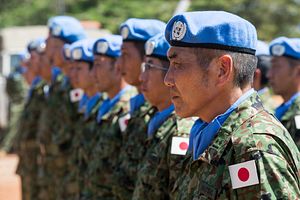The Japanese government is slated to oppose a U.S.-backed UN Security Council resolution calling for an arms embargo on South Sudan, government sources revealed on December 21, according to Kyodo News.
In another sign of the difficulty Japan faces in becoming a “normal” military power, a diplomat said that the government of Japanese Prime Minister Shinzo Abe is concerned that the arms embargo would endanger the lives of Japanese peacekeepers currently deployed in South Sudan.
On December 20, Japanese Defense Minister Tomomi Inada publicly said now was not the right time for an arms embargo and additional targeted sanctions, Reuters reports.
Given that the United States is Japan’s closest military ally, not backing a U.S.-backed UN resolution is highly unusual and has drawn the ire of Samantha Power, the U.S. ambassador to the United Nations.
“It’s a highly questionable logic to think that the way to keep your peacekeepers safe is to not support an arms embargo,” Powers told reporters, according to Reuters.
“Why would it be good for your peacekeepers to have a government whose people are starving spend what little money it has on weapons – large weapons systems – instead of on food?” she added. “It is in everyone’s interest, including the peacekeepers, for there to be fewer heavy weapons.”
U.S. diplomats said that Japanese officials privately called Power’s remarks “not helpful and counterproductive.” The U.S. ambassador to the United Nations is pushing to put the resolution to a vote before the end of the year.
There are currently 13,700 UN peacekeepers and police in the country, including 350 blue helmets of the Japan Ground Self Defense Force (JGSDF).
The JGSDF contingent, primarily military engineers, currently serving in South Sudan has been deployed with an expanded set of duties and new rules of engagement — a watershed event for the Japanese military.
As I explained in November (See: “Japan’s Military Deploys Abroad With New Rules of Engagement”), for the “first time since the beginning of Japan’s involvement in South Sudan in 2012, the military engineers will be allowed to come to the rescues of UN staff and non-governmental organizations’ personnel under armed attack using deadly force.”
Furthermore:
Under their new rules of engagement, Japanese peacekeepers are also now allowed to come to the rescue and support fellow UN troops of other peacekeeping contingents and can engage in military security operations including patrolling and vehicle inspections at checkpoints.
The new regulations are made possible by new legislation — the so-called Permanent International Peace Support Law and the Legislation for Peace and Security — that was passed by the Upper House of the Japanese Diet in 2015 under the initiative of the Abe government. The reluctance of Japan to support the arms embargo, however, illustrates that it will be a long path for the island nation to become comfortable with the application of military force.
































